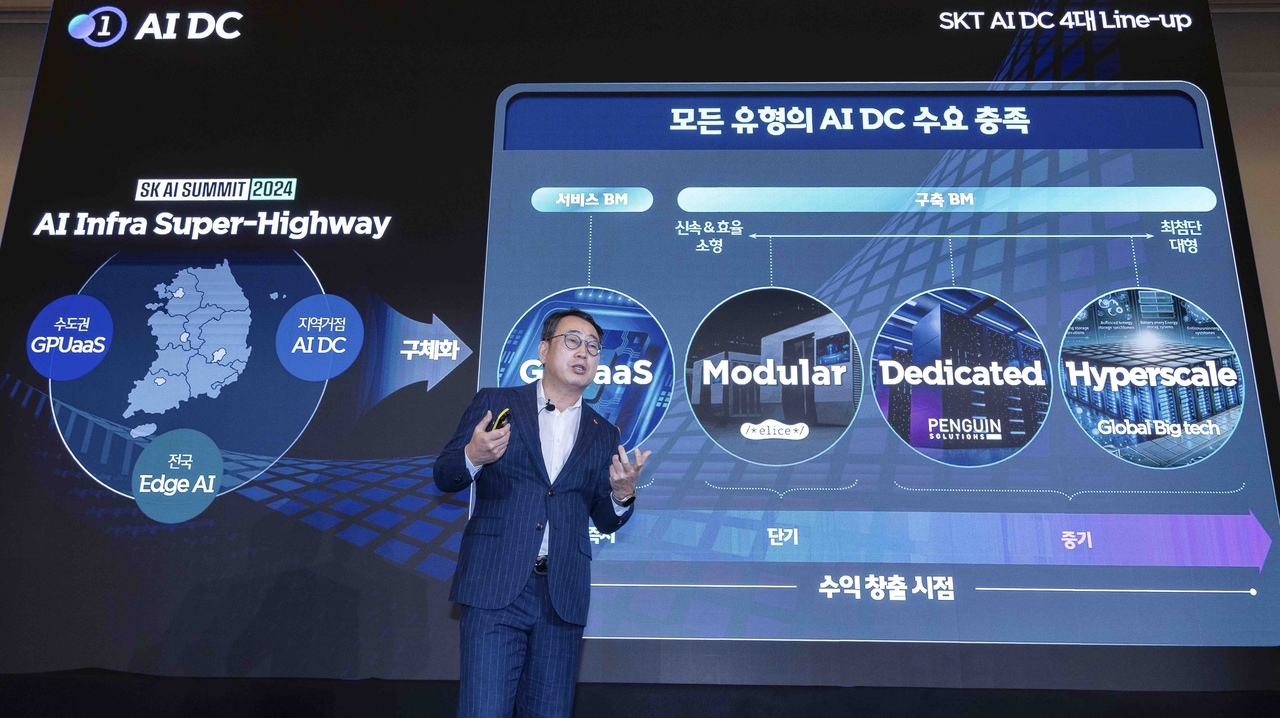
On the eve of Mobile World Congress 2025, SK Telecom CEO Ryu Young-sang unveiled an ambitious plan to build a hyperscale artificial intelligence data center in collaboration with global big tech firms.
Speaking at a press conference in Barcelona on Sunday, Ryu said that the facility will house 60,000 graphics processing units with a power consumption capacity of 100 megawatts, aiming to become key infrastructure for the company’s AI strategy. SK Telecom envisions expanding the facility’s scale to one to two gigawatts, establishing it as a key hub in the Asia-Pacific region.
Once completed, the telecom carrier’s AI data center is expected to be the largest in Korea. The country is still in the early stages of AI data center development, with the government planning to invest up to 2.5 trillion won ($1.7 billion) by 2027 to build the National AI Computing Center, which will house only 30,000 GPUs -- half the size of SK Telecom’s planned infrastructure.
Leveraging its extensive experience in data center operations and nationwide telecommunications infrastructure, SK Telecom has been actively expanding its presence in the AI data center market.
The company inaugurated its first AI data center in Seoul last year, introducing cloud-based GPU-as-a-Service. SK Telecom aims to mitigate the ongoing global GPU supply shortage by strengthening its partnership with Lambda, a key supplier of Nvidia’s latest GPUs. Additionally, it continues to pursue synergies with its affiliates, including SK hynix, which produces high-bandwidth memory and Rebellions, a neural processing unit developer.
The telecom carrier chief outlined four key business models for SK Telecom’s AI data center initiatives: GPUaaS, hyperscale AI data centers, modular AI data centers and customized AI data centers.
“Modular AI data centers can be constructed within three months in 20-40 kW units, similar to container boxes. They reduce construction costs by 70 percent and double a center's power efficiency, making them ideal for startups and research institutions in urgent need of GPU resources,” he said.
SK Telecom also plans to complete the development of version 4.0 of its proprietary large language model, A.X, in the first half of this year, further advancing its conversational AI and multimodal capabilities. Ryu noted that A.X has already fully replaced ChatGPT in AI call summaries for the company’s A. service app.
Meanwhile, Aster, a new AI service set to launch in North America this month, is part of SK Telecom’s broader strategy to expand its global footprint. “We will launch A. Biz, a business-oriented version of the A. service, across 21 SK Group affiliates this year to solidify our position in the AI B2B market,” he said.
Through the Global Telco AI Alliance -- a coalition of major telecom firms, including Deutsche Telekom, SoftBank, e&, and Singtel -- SK Telecom plans to localize and expand Aster beyond North America. The alliance is also on track to establish a joint venture by the end of this month, further strengthening cross-industry collaboration.
yeeun@heraldcorp.com




